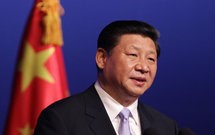 China's Central Discipline Inspection Committee detained Tianjin Police Chief Wu Changshun on July 19, shortly after reports emerged of rampant corruption in the state-owned construction sectors in Tianjin. Chinese media is now confirming the details of the alleged corruption. Wu's arrest coincided with the announcement that China's 4th Party Plenum in October would focus on personnel policy and the fight against corruption. Although the report did not include specific details, Stratfor has heard rumors suggesting at least one aspect of the discussion will involve curbing the power of the police and the internal security apparatuses, which are often seen to operate extralegally.
China's Central Discipline Inspection Committee detained Tianjin Police Chief Wu Changshun on July 19, shortly after reports emerged of rampant corruption in the state-owned construction sectors in Tianjin. Chinese media is now confirming the details of the alleged corruption. Wu's arrest coincided with the announcement that China's 4th Party Plenum in October would focus on personnel policy and the fight against corruption. Although the report did not include specific details, Stratfor has heard rumors suggesting at least one aspect of the discussion will involve curbing the power of the police and the internal security apparatuses, which are often seen to operate extralegally.
Interestingly, the police force and internal security in general were under the purview of the powerful Zhou Yongkang, China's former domestic security chief on the Politburo Standing Committee who was recently released from duty for corruption. Under Zhou's influence, the Party's Central Politics and Law Commission was accused of a heavy-handed approach that operated outside judicial oversight and earned the ire of many social groups, including migrant workers, ethnic minorities and the poor.
Consolidating state security has been a priority for President Xi Jinping. Xi weakened the Party's Central Politics and Law Commission when he entered office in November 2012. At the 3rd Party Plenum in 2013, Xi formed the National Security Commission and placed it directly under his control. The commission gives Xi greater leverage over internal security forces and a combined oversight of the civilian and military security apparatuses.
Having removed Zhou, Xi is now ready to take the next step in the fight against corruption. The police, military and security apparatuses are not immune to Xi's anti-corruption campaign, and these security forces will come under increased scrutiny as the campaign forges ahead in an attempt to protect the party's legitimacy.
Courtesy : Stratfor (www.stratfor.com)